From a traditional military march to a balloon parade, musical performances and a re-enactment of the nation’s history, tens of thousands of Taiwanese and foreigners yesterday experienced a series of unique celebrations for President Tsai Ing-wen’s (蔡英文) inauguration.
Hours before the ceremonies in front of the Presidential Office Building started, nearly 30,000 people had arrived, with some eager to find seats, while others talked with friends and took photographs against the backdrop of the main stage and the building.
A 21-gun salute also drew a large crowd, who surrounded the soldiers to take photographs.
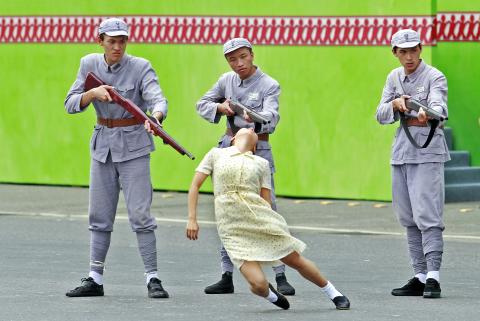
Photo: Chiang Ying-ying, AP
A performance by the joint military marching band started the celebrations at 9am.
Following the band’s performance was a re-enactment of Taiwanese history, from the activities of the Aboriginal inhabitants to the Dutch and Spanish occupation, the Han Chinese migration, Japanese occupation and the Chinese Nationalist Party (KMT) regime’s authoritarian rule after World War II. A performance about the nation’s democratization followed.
Various artists who have participated in social movements, such as rock band Fire Ex (滅火器), Lin Sheng-xiang (林生祥) and Panai Kusui, performed on a stage erected in front of the building.
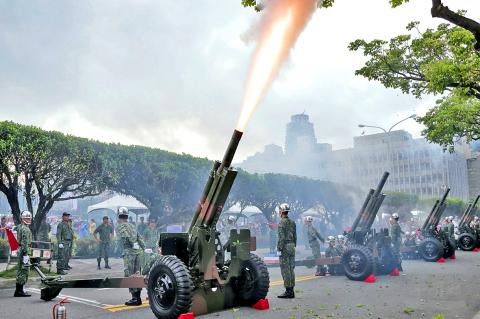
Photo: EPA/Military News Agency
Actors depicted campaigners for major political and social movements in Taiwan’s democratization — such as Deng Nan-jung (鄭南榕), who ran a number of dissident magazines and self-immolated in 1989 in protest against government restrictions on the freedom of speech, and the 1990 Wild Lily Student Movement, which helped accelerate the dissolution of the national assembly.
After Tsai and Vice President Chen Chien-jen (陳建仁) completed the official handover and swearing-in ceremony inside the Presidential Office Building, they walked out to greet the crowd and were saluted by the military band at 11am.
Before Tsai’s inaugural address, a group of Paiwan children, several children’s choirs and Jingmei Girls High School students joined Tsai and Chen in singing the Republic of China national anthem, rearranged to blend in with a traditional Paiwan tune.
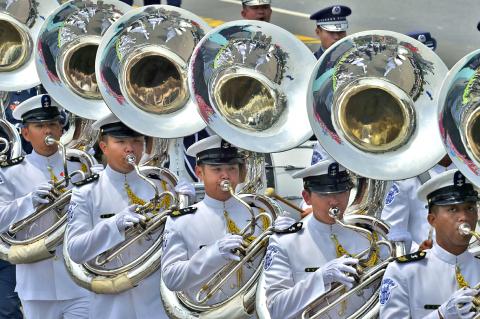
Photo: Sam Yeh, AFP
“This is not the first time I have attended a presidential inauguration, but the performances today were great. I liked them a lot,” onlooker Lan Cheng-peng (藍正朋) said. “In the past, programs were designed to convey a sense of the authority of the president, but this time, it is more like a festival and you could see that the celebrations were centered around the people, not the political leader.”
While the performances drew many positive reviews, they were not without detractors.
Some rights advocates said that some of the performances showed the popular belief that the arrival of Western religion and influenced helped rid Aborigines of their “boorish and uncultivated” characteristics.
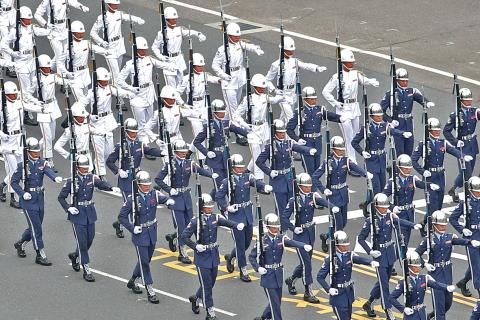
Photo: CNA
The celebrations ended with the singing of Meilidao (美麗島, Formosa) and a fly-by by the air force’s Thunder Tiger Squadron.
Meilidao, a folk song from the late 1970s, describes how beautiful Taiwan is and how the people’s ancestors are watching over them. The song was banned by the former Chinese Nationalist Party (KMT) government after the 1979 anti-government demonstration organized by Formosa magazine, which also became known as the Kaohsiung Incident.
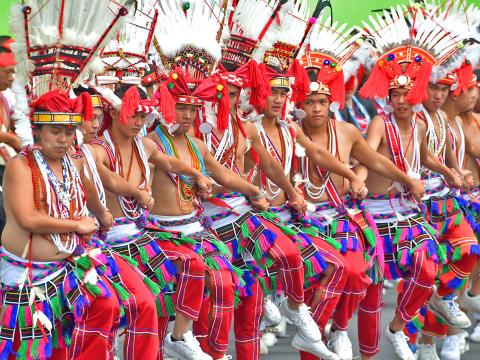
Photo: Liao Chen-huei, Taipei Times
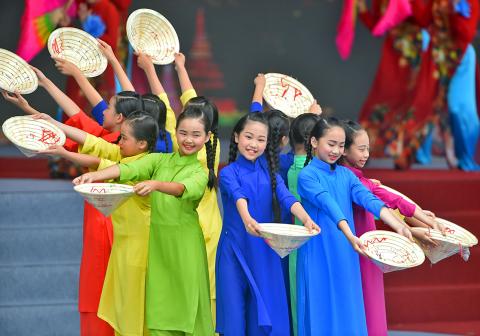
Photo: Liao Chen-huei, Taipei Times
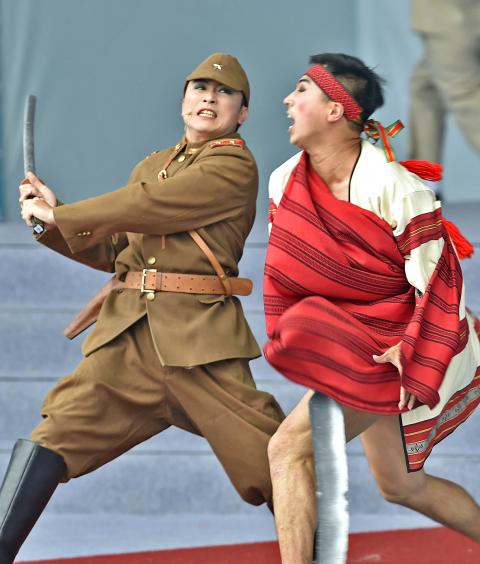
Photo: Sam Yeh, AFP

CHAOS: Iranians took to the streets playing celebratory music after reports of Khamenei’s death on Saturday, while mourners also gathered in Tehran yesterday Iranian Supreme Leader Ayatollah Ali Khamenei was killed in a major attack on Iran launched by Israel and the US, throwing the future of the Islamic republic into doubt and raising the risk of regional instability. Iranian state television and the state-run IRNA news agency announced the 86-year-old’s death early yesterday. US President Donald Trump said it gave Iranians their “greatest chance” to “take back” their country. The announcements came after a joint US and Israeli aerial bombardment that targeted Iranian military and governmental sites. Trump said the “heavy and pinpoint bombing” would continue through the week or as long

TRUST: The KMT said it respected the US’ timing and considerations, and hoped it would continue to honor its commitments to helping Taiwan bolster its defenses and deterrence US President Donald Trump is delaying a multibillion-dollar arms sale to Taiwan to ensure his visit to Beijing is successful, a New York Times report said. The weapons sales package has stalled in the US Department of State, the report said, citing US officials it did not identify. The White House has told agencies not to push forward ahead of Trump’s meeting with Chinese President Xi Jinping (習近平), it said. The two last month held a phone call to discuss trade and geopolitical flashpoints ahead of the summit. Xi raised the Taiwan issue and urged the US to handle arms sales to

State-run CPC Corp, Taiwan (CPC, 台灣中油) yesterday said that it had confirmed on Saturday night with its liquefied natural gas (LNG) and crude oil suppliers that shipments are proceeding as scheduled and that domestic supplies remain unaffected. The CPC yesterday announced the gasoline and diesel prices will rise by NT$0.2 and NT$0.4 per liter, respectively, starting Monday, citing Middle East tensions and blizzards in the eastern United States. CPC also iterated it has been reducing the proportion of crude oil imports from the Middle East and diversifying its supply sources in the past few years in response to geopolitical risks, expanding

Pro-democracy media tycoon Jimmy Lai’s (黎智英) fraud conviction and prison sentence were yesterday overturned by a Hong Kong court, in a surprise legal decision that comes soon after Lai was jailed for 20 years on a separate national security charge. Judges Jeremy Poon (潘兆初), Anthea Pang (彭寶琴) and Derek Pang (彭偉昌) said in the judgement that they allowed the appeal from Lai, and another defendant in the case, to proceed, as a lower court judge had “erred.” “The Court of Appeal gave them leave to appeal against their conviction, allowed their appeals, quashed the convictions and set aside the sentences,” the judges